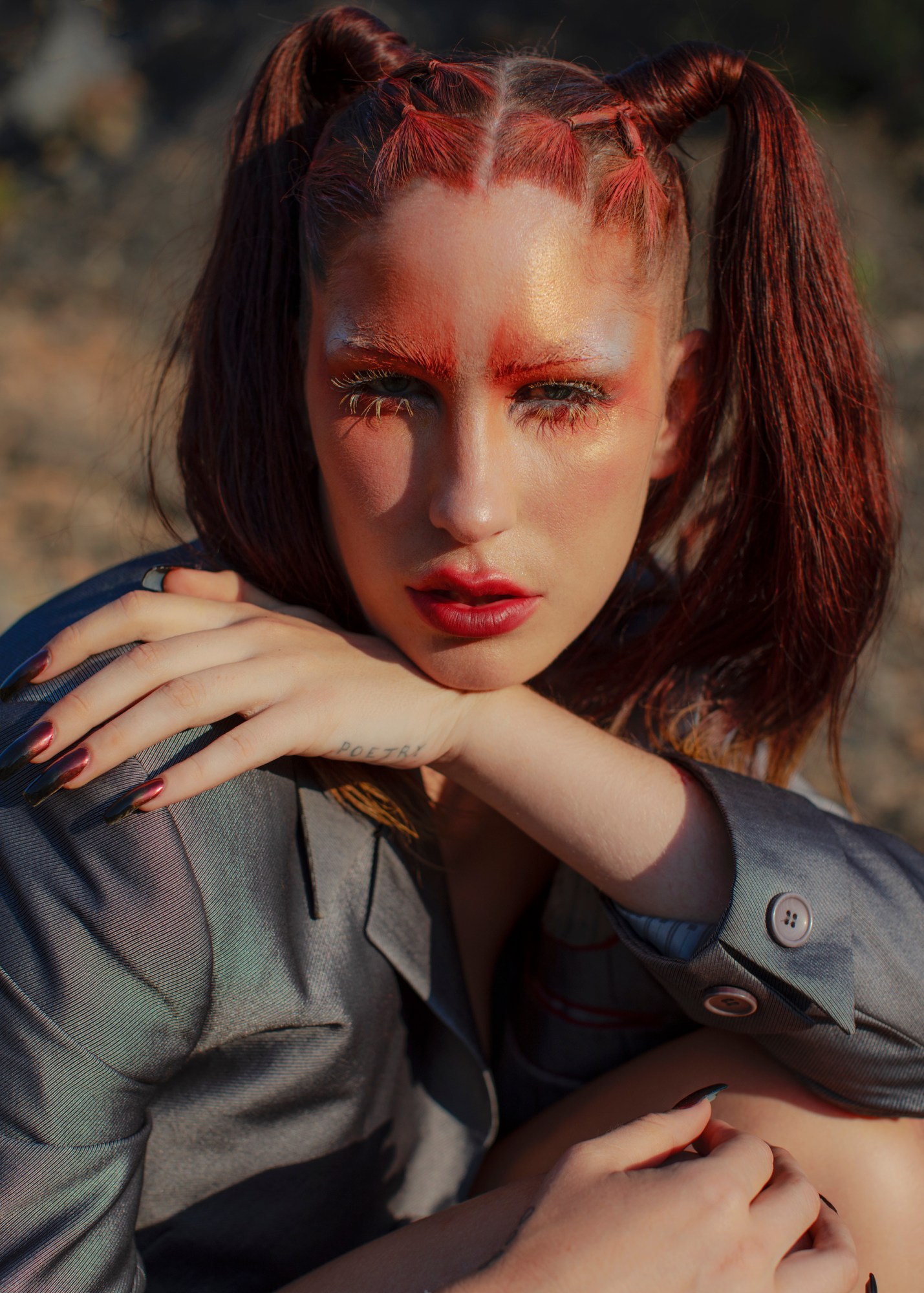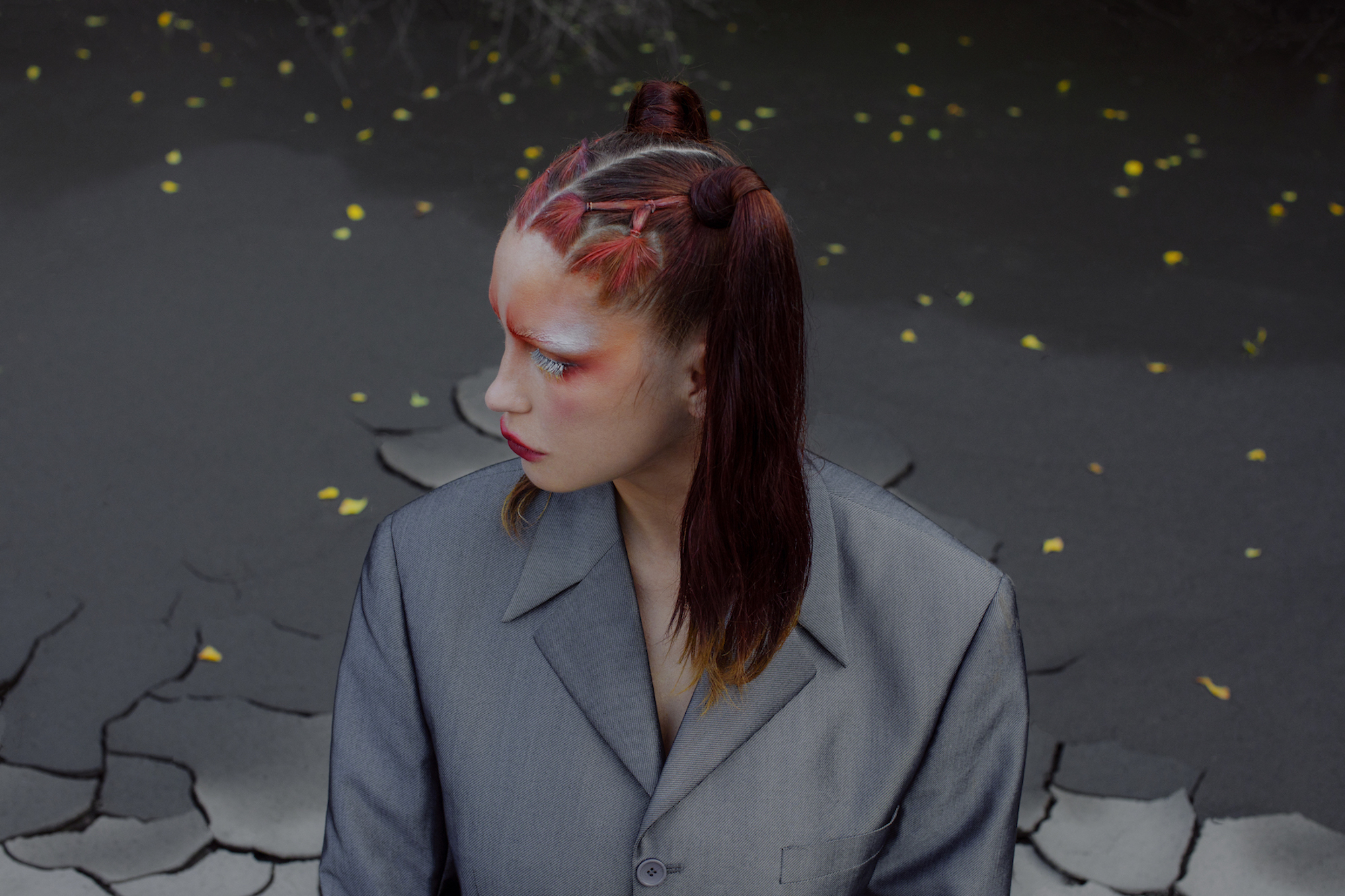Alex Drewchin was at Paris Fashion Week in March, when news broke that someone in New York City had tested positive for COVID-19. Many people’s lives were suddenly thrown into chaos, but Alex’s situation was particularly sticky. She was living in Queens with a woman in her late 70s — who was also her landlord — and she was too scared to let Alex in the house when she returned from Europe. The artist, who began performing as Eartheater 10 years ago, was forced to head straight to her mother’s house in Pennsylvania and quarantine there with her brothers.
Despite the inconvenience of not being able to grab any of her stuff — “I’m still not able to go back there until there is a vaccine,” she says — the pandemic brought some relief. Leading up to lockdown she’d been touring non-stop, promoting an EP called Angel Lust that she recorded with the harp and violin duo LEYA, and working on her fourth full-length album Phoenix: Flames Are Dew Upon My Skin, which arrives on October 2 via the Berlin record label PAN (who recently reissued Arca’s debut mixtape &&&&&). It was nice to just lie on her mom’s couch for a week and do nothing, Alex says.
Phoenix was conceived at the tail end of 2019 during a 10-week artist residency in Zaragoza, Spain, and was completed in New York in March (“we shot the cover the week before everything went dead,” Alex says). Like her adopted name suggests, Eartheater’s music has always felt very alien. Techno beats, rap vocals, ambient synth and a wide variety of acoustic and electronic sounds have all found a home within her songs. This time though, Alex decided to concentrate on acoustic sound — a not so unpredictable move considering she hates being pigeonholed. “People decide that because they’ve heard a couple of things then they know who you are,” she says. “That’s a really frustrating thing to me.”

“I have been really tickled in the past by not adhering to any formula,” she continues. “But now I find myself drifting more towards cohesion. To me, Phoenix is the most cohesive record I have ever made.” But that doesn’t mean Phoenix is straightforward. Alex rejects the idea that acoustic instruments represent the past, in her mind they are the sound of the post-apocalyptic future, and the music on Phoenix remains accordingly chaotic.
Here, Eartheater discusses the impact of her residency in Spain, recording duct tape and playground swings and why she thinks the pandemic could lead to a revival of playing instruments again.
You mentioned at the beginning of the pandemic that you often go through “music prison periods,” where you lock yourself in your room to write. Did you go through one of those periods while writing this album?
I definitely go through self-imposed, monastic, solitary periods in New York. I’ve had to do that in order to get anything done, because I’m very easily seduced by my friends. But I didn’t even have to fight for it this time. This time I had no choice because I finished Trinity and then the next day I dipped out to Spain — to a town where I knew absolutely nobody. I had no distractions, so I was able to sink into this monastic, hermetic vibe immediately. For about a month I was very alone, and it was very cool and sort of mystifying. I think some people have way more understanding of their process, but I have never had that. I’ve never had a formula or had tricks to get me going. Sure, picking up a guitar and just doing something helps, but it was so cool, the way the record just started to spiral around me. It felt like it was tapping into something that had been growing inside of me for years and years.

Did you have any demos, or any ideas towards the next album before you left for Spain, or was all developed after you arrived there?
I knew I wanted to do acoustic sound, but I had very little planned. I had no whiffs of fantasy yet. And in the past, my records have come together bit by bit. Usually there is a period where I am collecting artifacts and ideas, making notes, jotting down lyrics and recording little sounds. Then it culminates in a really intense period of putting everything together. But with this record there was absolutely none of that. I arrived in Spain and I had no idea what I was going to do. So I took a lot of walks and I slept a lot for a week and then I wrote “Below The Clavicle.” It’s interesting, because when I look at the shape of [the song], it’s as if I am turning a stone in my hand. One side is rough and jagged, and if I turn it around, on another side there is a fossil, and on another side there is this glimmer of marble and a tiny bit of crystal. There are so many different stories within that song, and that’s what’s been really fun lately, it’s been figuring out the double, triple entendre, the free associative lyrical lexicon that allows things to be interpreted in many different ways. When I listen to that song I’m hearing very different parts of myself, and I’m hearing a lot of patience. That’s what the song is about — it’s about having patience and keeping your mouth shut until you really know what you have to say. Just allowing something to develop underground, below the clavicle — the metaphor for underground, the heart, the feet, the pussy, everything below the head.
Acoustic guitar is at the very core of this album. What drew you back to that instrument?
That’s a really great question. I had to scratch a lot of itches and prove a lot of things to myself, and maybe to a lot of other people, too, before I went and did the singer-songwriter thing. I don’t hang out with a lot of other singer-songwriters — I’m not in that community — I hang out with rappers, noise freaks and club kids. So after having done everything that I’ve done, especially post-Trinity, which is the most accessible record I have ever made, it’s almost this seal or this cherry on top of all the crazy banana slip, chocolate fondue mountain that I have been working on for the last 10 years. I threw on the cherry and now I’m like, okay, now I can go back to that initial thing.
You didn’t attend art school or a music conservatory, you got your education mostly in New York’s DIY scene. What was it like crossing over into that world and working with the Spanish conservatory group. Were you able to naturally find a groove with them?
My most informative classical training was when I was asked to compose for Alarm Will Sound. They’re this contemporary classical orchestra that got famous because they transcribed a lot of Aphex Twin’s music into classical music. They got a really cool grant and then asked me to compose some music for them, so it’s since then that I’ve been way more interested in composing chamber music for people. So by the time I got to Zaragoza I was ready for that, I was very eager. Plus, it’s much easier to write for seven players as opposed to 22. And they’re such simple compositions, I think that’s one of the things I was most okay with was just letting the music happen without trying to make too much of a statement. In the past I think I was always challenging myself and saying, “But can you do that in a more interesting way?” With this I wanted to just distill a simple emotion, or distill something that was somewhat easy to play. It was pretty smooth. I’d say that the most difficult thing was just cramming all of that into two and a half months.
I love this quote from the album bio, which is on topic with what you were saying earlier about acoustic sound. It reads: “Phoenix prepares for a future where electronic sound — or even electricity itself — isn’t guaranteed, but where music can still come to life with a group of hands dexterously winding across instruments against the light of the fire.”
It’s interesting to me how acoustic sound is often thought of as something from the past, when hypothetically, if shit hits the fan and there is no power, if power goes out, then who is going to be playing music together? You’re all going to be calling me, Adam and Marilou [of LEYA], and then it becomes the sound of the post-apocalyptic future, as opposed to something that is associated with the past. That is an important energy that excites me when I think about this record.
You’re predicting that music will come full-circle.
I’m telling you, there are going to be so many people out there that start to play instruments, just watch. All of these rappers, all these lil’ club kids, everyone is gonna start playing in bands and playing instruments again — I can feel it.

It’s already started. Some SoundCloud rappers have started playing with electric guitars again.
It’s really interesting to me to see the conjunction between the starvation period of a pandemic and how that re-informs the excitement, honor and appreciation of music, and playing music together. I think a lot of people were becoming really spoiled and not appreciating a show enough, or seeing it as this meat market moment where you just try to get some carnal kick, rather than a real musical experience. I’m not saying that I was seeing that across the board, but I did start seeing this complacency in a lot of scenes, and it was a little bit sad. I think that a silver lining to this period is that it’s going to be really fun to see people just vibrating on music again.
Your music always has a lot of interesting layers. Did you include many found sounds or field recordings on this album?
With this album, I told myself that if anything sounds electronic then I’m going to generate it from an acoustic sound that I will then process. My favorite sounds are in “Burning Feather” — that screeching, squeaky sound, that is a field recording of playground swings. I layered hundreds of them. A sound that was super fun making is in “How To Fight.” I was in the studio with my engineer Kiri [Stensby] after I got back from Zaragoza, and I thought, this needs a new sound, it needs a new character to add some emotional nuance to it because that song spans so many emotions and feelings. I looked across the room and I saw a roll of duct tape and I could hear the sound of duct tape unrolling in my mind. So I brought it over to the microphone and I just started ripping duct tape. And Kiri has this wild delay pedal, so I turned down the dry and turned the wet all the way up and it made this sound that you’d never guess was duct tape ripping. It doesn’t resemble that sound at all.


